An overview of selected current approaches to the characterization of aqueous inorganic clusters
Abstract
This Perspective article highlights some of the traditional and non-traditional analytical tools that are presently used to characterize aqueous inorganic nanoscale clusters and polyoxometalate ions. The techniques discussed in this article include nuclear magnetic resonance spectroscopy (NMR), small angle X-ray scattering (SAXS), dynamic and phase analysis light scattering (DLS and PALS), Raman spectroscopy, and quantum mechanical computations (QMC). For each method we briefly describe how it functions and illustrate how these techniques are used to study cluster species in the solid state and in solution through several representative case studies. In addition to highlighting the utility of these techniques, we also discuss limitations of each approach and measures that can be applied to circumvent such limits as it pertains to aqueous inorganic cluster characterization.


 Please wait while we load your content...
Please wait while we load your content...